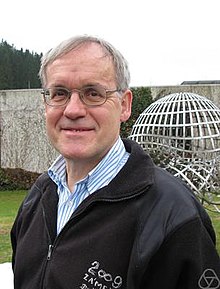
Summary
Alexander (Lex) Schrijver (born 4 May 1948 in Amsterdam)[1] is a Dutch mathematician and computer scientist, a professor of discrete mathematics and optimization at the University of Amsterdam and a fellow at the Centrum Wiskunde & Informatica in Amsterdam.[2] Since 1993 he has been co-editor in chief of the journal Combinatorica.[2][3]

Biography edit
Schrijver earned his Ph.D. in 1977 from the Vrije Universiteit in Amsterdam, under the supervision of Pieter Cornelis Baayen.[4] He worked for the Centrum Wiskunde & Informatica (under its former name as the Mathematisch Centrum) in pure mathematics from 1973 to 1979, and was a professor at Tilburg University from 1983 to 1989. In 1989 he rejoined the Centrum Wiskunde & Informatica, and in 1990 he also became a professor at the University of Amsterdam. In 2005, he stepped down from management at CWI and instead became a CWI Fellow.[2][5]
Awards and honors edit
Schrijver was one of the winners of the Delbert Ray Fulkerson Prize of the American Mathematical Society in 1982 for his work with Martin Grötschel and László Lovász on applications of the ellipsoid method to combinatorial optimization; he won the same prize in 2003 for his research on minimization of submodular functions.[6][7] He won the INFORMS Frederick W. Lanchester Prize in 1986 for his book Theory of Linear and Integer Programming, and again in 2004 for his book Combinatorial Optimization: Polyhedra and Efficiency. He was an Invited Speaker of the International Congress of Mathematicians (ICM) in 1986 in Berkeley[8] and of the ICM in 1998 in Berlin.[9] In 2003, he won the George B. Dantzig Prize of the Mathematical Programming Society and SIAM for "deep and fundamental research contributions to discrete optimization".[7] In 2006, he was a joint winner of the INFORMS John von Neumann Theory Prize with Grötschel and Lovász for their work in combinatorial optimization, and in particular for their joint work in the book Geometric Algorithms and Combinatorial Optimization showing the polynomial-time equivalence of separation and optimization.[10] In 2008, his work with Adri Steenbeek on scheduling the Dutch train system was honored with INFORMS' Franz Edelman Award for Achievement in Operations Research and the Management Sciences.[11][12] He won the SIGMA prize of the Dutch SURF foundation in 2008, for a mathematics education project.[13] In 2015 he won the EURO Gold Medal, the highest distinction within Operations Research in Europe.
In 2005 Schrijver won the Spinoza Prize of the NWO, the highest scientific award in the Netherlands, for his research in combinatorics and algorithms.[14] Later in the same year he became a Knight of the Order of the Netherlands Lion.[5] In 2002, Schrijver received an honorary doctorate from the University of Waterloo in Canada, and in 2011 he received another one from Eötvös Loránd University in Hungary.[11]
Schrijver became a member of the Royal Netherlands Academy of Arts and Sciences in 1995.[15] He became a corresponding member of the North Rhine-Westphalia Academy for Sciences and Arts in 2005,[16] joined the German Academy of Sciences Leopoldina in 2006,[17] and was elected to the Academia Europaea in 2008.[18] In 2012 he became a fellow of the American Mathematical Society.[19]
Books edit
- Theory of Linear and Integer Programming (Wiley, 1986, reprinted 1998, ISBN 9780471982326)
- Grötschel, Martin; Lovász, László; Schrijver, Alexander (1993), Geometric algorithms and combinatorial optimization, Algorithms and Combinatorics, vol. 2 (2nd ed.), Springer-Verlag, Berlin, doi:10.1007/978-3-642-78240-4, ISBN 978-3-642-78242-8, MR 1261419
- Combinatorial Optimization (with William J. Cook, William H. Cunningham, and William R. Pulleyblank, Wiley and Sons, Wiley Series in Discrete Mathematics and Optimization 33, 1998, reprinted 2011, ISBN 9781118031391)
- Combinatorial Optimization: Polyhedra and Efficiency (Springer, Algorithms and Combinatorics 24, 2003, ISBN 9783540443896)
References edit
- ^ Biography at the NWO website
- ^ a b c Profile, CWI, retrieved 2012-03-30.
- ^ Combinatorica journal home page, Springer, retrieved 2012-03-30.
- ^ Alexander Schrijver at the Mathematics Genealogy Project
- ^ a b Royal honours for mathematician Alexander Schrijver Archived 2013-02-22 at archive.today, University of Amsterdam, September 21, 2005, retrieved 2012-03-30.
- ^ AMS Awards, retrieved 2012-03-30.
- ^ a b Prestigious prizes awarded to Lex Schrijver and Bert Gerards, CWI, retrieved 2012-03-30.
- ^ Schrijver, Alexander (1987). "Polyhedral combinatorics—Some recent developments". In: Proceedings of the International Congress of Mathematicians, August 3–11, Berkeley. Providence, R.I.: American Mathematical Society. pp. 1431–1443.
- ^ Schrijver, Alexander (1998). "Routing and timetabling by topological search". Doc. Math. (Bielefeld) Extra Vol. ICM Berlin, 1998, vol. III. pp. 687–695.
- ^ INFORMS Awards for Alexander Schrijver Archived 2012-05-24 at the Wayback Machine, retrieved 2012-03-30.
- ^ a b Mathematician Lex Schrijver receives honorary doctorate, CWI, May 9, 2011, retrieved 2012-03-30.
- ^ 2008 Franz Edelman Award Winner Archived 2012-04-02 at the Wayback Machine, INFORMS, retrieved 2012-03-30.
- ^ SIGMA prize 2008 for DisWis, CWI, August 20, 2008, retrieved 2012-03-30.
- ^ Spinoza Prize for mathematician Lex Schrijver Archived 2012-09-10 at archive.today, University of Amsterdam, June 7, 2005, retrieved 2012-03-30.
- ^ KNAW member profile Archived 2011-05-13 at the Library of Congress Web Archives, retrieved 2012-03-30.
- ^ NRW members for natural science and medicine Archived 2012-01-13 at the Wayback Machine, retrieved 2012-03-30.
- ^ Leopoldina member profile, retrieved 2024-02-29.
- ^ AE member profile, retrieved 2012-03-30.
- ^ List of Fellows of the American Mathematical Society, retrieved 2013-07-14.


